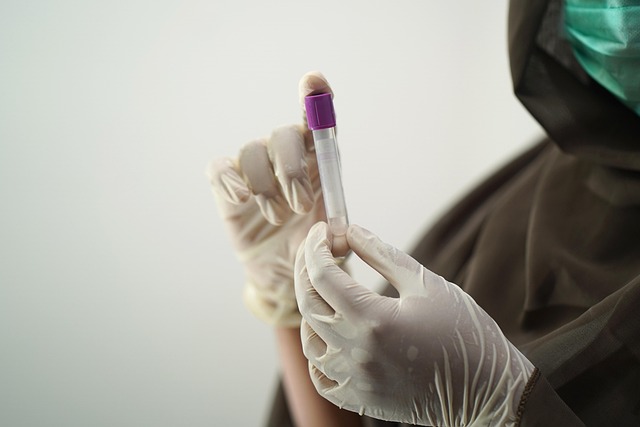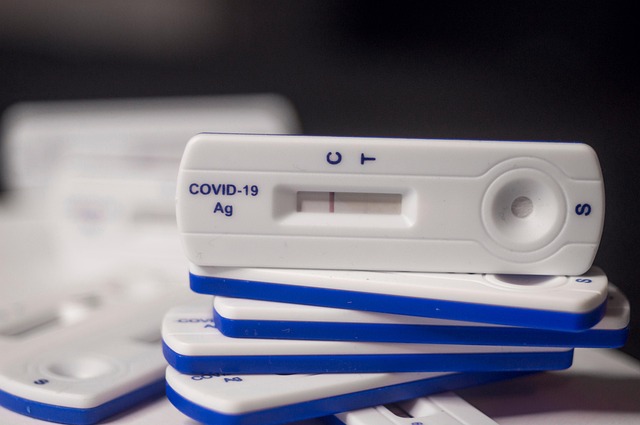After age 40, an online testosterone blood test monitors vital hormone levels for men. Normal ranges vary by age group, with athletes and individuals with higher muscle mass potentially having elevated levels. Accurate interpretation requires professional guidance after self-testing to ensure safe, personalized management. Natural ways to maintain healthy testosterone include exercise, quality sleep, and a balanced diet rich in protein and vegetables.
“Unraveling the mysteries of testosterone levels is crucial for understanding male health. This hormone plays a vital role in various bodily functions, from muscle mass to mood. In this comprehensive guide, we demystify the normal testosterone range and its variations across age groups.
Learn about the factors affecting these levels and how to interpret an online testosterone blood test accurately. Discover natural ways to maintain optimal testosterone, ensuring you stay in control of your health. Explore our sections on hormone basics, age-specific levels, influencing factors, test interpretation, and more.”
- Understanding Testosterone: The Hormone Basics
- Normal Testosterone Levels by Age Group
- Factors Influencing Testosterone Range
- Interpreting Testosterone Blood Test Results
- Online Testosterone Testing: Pros and Cons
- Maintaining Healthy Testosterone Levels Naturally
Understanding Testosterone: The Hormone Basics

Testosterone is a hormone that plays a pivotal role in various bodily functions, primarily in males. It’s responsible for triggering and maintaining male sexual development, including muscle growth, bone mass, fat distribution, and red blood cell production. Understanding testosterone levels is crucial, especially as age progresses. For men over 40, considering a testosterone level test online can be a proactive step to monitor their health.
An online testosterone blood test is a convenient way to assess hormone levels from the comfort of your home. The best time of day for this test is typically in the morning, before any food or caffeine has been consumed, as these factors can influence results. This simple procedure involves drawing a small sample of blood, which is then analyzed to determine if testosterone levels fall within the normal range. Knowing your testosterone level is essential for overall well-being and can help identify potential health concerns early on.
Normal Testosterone Levels by Age Group

Testosterone levels vary across different age groups, with specific normal ranges established for each stage of life. In general, younger men (ages 19-30) typically have higher testosterone levels, ranging from approximately 270 to 1070 nanograms per deciliter (ng/dL). As individuals age, these levels tend to decrease gradually. For men aged 31-50, the normal range is often cited as 250 to 900 ng/dL, while in those over 50, it can drop to 200 to 700 ng/dL.
When considering an online testosterone blood test or exploring online testosterone screening packages, it’s essential to understand these age-related norms. If you’re curious about your levels and have questions like “does insurance cover online testosterone tests?” or “what questions to ask before an online testosterone test,” consulting with a healthcare professional can provide valuable insights. They can help interpret the results and determine if any potential imbalances require further evaluation.
Factors Influencing Testosterone Range

Testosterone levels can vary greatly depending on several factors. Age is a significant influencer; levels tend to peak during adolescence and early adulthood, then gradually decline with age. Hormonal balance is also crucial; fluctuations in other hormones, like estrogen and cortisol, can impact testosterone readings.
Physical activity and nutrition play a role too. Athletes or individuals with higher muscle mass might have elevated testosterone levels due to the hormone’s association with lean body mass. Conversely, conditions like hypothyroidism, which affects metabolism, can lead to lower testosterone levels. For accurate assessments, an online testosterone blood test is recommended. While at-home testosterone tests (how accurate are at-home testosterone tests) offer convenience, they might not be as precise as laboratory-based tests. An online testosterone test for athletes can provide valuable insights, but it’s essential to interpret results in context.
Interpreting Testosterone Blood Test Results

When interpreting your testosterone blood test results from an online testosterone blood test, understanding the normal range is key. The typical reference range for total testosterone levels in men is approximately 300-1000 nanograms per deciliter (ng/dL) or 10.4-34.7 nanomoles per liter (nmol/L). However, these values can vary slightly between labs and countries, so it’s essential to confirm the specific reference range used by your testing facility.
A cheap testosterone tests delivered online can provide valuable insights into your hormone levels, but self-interpretation should be approached with caution. While these tests offer accessibility and convenience, consulting a healthcare professional after receiving your results is crucial for accurate assessment and personalized guidance. They can help you understand if your testosterone levels fall within the healthy range or require further investigation, especially when considering whether it’s safe to buy testosterone online.
Online Testosterone Testing: Pros and Cons

Online testosterone blood testing has gained popularity as a convenient way to check hormone levels, offering both pros and cons compared to traditional medical assessments. One advantage is accessibility; individuals can order these tests from home, eliminating the need for in-person visits. This method provides a private, discreet way for people to monitor their testosterone levels, especially those considering testosterone therapy options explained online. It’s particularly appealing for athletes or individuals concerned about potential hormone imbalances.
However, when questioning how accurate are at-home testosterone tests, the science is mixed. While these tests can provide valuable insights, they may not always reflect precise results. Factors like proper sample collection and handling can influence accuracy. Moreover, online testing may not replace a comprehensive medical evaluation, as it lacks the detailed analysis and interpretation of a healthcare professional. As such, while online testosterone blood tests offer convenience, they should be used in conjunction with other diagnostic tools for a complete understanding of hormone health.
Maintaining Healthy Testosterone Levels Naturally

Maintaining healthy testosterone levels naturally involves several lifestyle changes and habits that can support your body’s production of this vital hormone. Regular exercise, particularly strength training and high-intensity interval workouts, has been shown to boost testosterone levels. Adequate sleep is crucial; aim for 7-9 hours per night as this is when the body produces the most testosterone. A balanced diet rich in lean proteins, healthy fats, and fruits and vegetables provides the necessary nutrients for hormone production. Some foods known to support testosterone include zinc-rich oysters, magnesium-packed nuts, and vitamin D-rich fatty fish.
Before considering an online testosterone blood test, it’s important to ask yourself some questions. What does a normal testosterone level look like online? How to interpret testosterone test results online? Understanding these aspects can help you make informed decisions about your health. Remember that individual variations exist, and consulting with a healthcare professional is essential for personalized advice and guidance on managing your testosterone levels naturally.
Understanding normal testosterone levels is crucial for overall health, especially as it varies by age. This article has broken down the science behind this powerful hormone, offering insights into its natural fluctuations and the factors that can influence them. Whether you’re considering an online testosterone blood test or seeking natural ways to maintain healthy levels, the information provided here serves as a comprehensive guide. Remember, informed decisions about your health are always beneficial, so consult with healthcare professionals for personalized advice.
